Stars & Empire: 10 Galactic Tales Read online
Page 5
I also got back into the MPZ several times, making drug deliveries and, on one occasion, conducting a robbery. We used the vast underground city to get past security and into Midtown. The ancient tunnels, power conduits, rail lines, sewers, and other infrastructure, much of it abandoned, weaved a tangled web under the entire city, and we had a number of routes mapped out.
We owned the underground mazes, but trips into the MPZ were still dangerous missions, and it was on one of these narcotics delivery runs that I was caught. We made our way through the old underground rail tunnels to an abandoned station situated below a large apartment building. There was a rough cut passageway from the station to the sub-basement of the building.
The exit from the tunnel was hidden behind some machinery, but someone must have found it, because as soon as we squeezed out, the doors opened and cops in riot gear poured into the room. We opened fire simultaneously, but they had body armor and better guns. It was over in less than a minute. There were seven of us, and four were wounded. The rest of us were hit by stun rods, and by the time we woke up we were shackled and leaning against one of the walls.
There was a neat row of four bodies along one of the walls, each one with a single hole in the forehead in addition to whatever original wound they had. Gang members had a zero health care priority, so the police didn’t even bother bringing in the wounded. However, they did try to arrest the occasional live prisoner, if only to dispel the image, largely accurate, that they just went out and shot anyone they felt like.
They dragged me outside and into a waiting transport and shoved me through the rear hatch. The inside was a large open area with no seating. There was a long metal pole running along each side, and my wrist shackles were fastened to the one on the right. My two companions were chained to the pole on the other side.
The transport drove to another location where four more prisoners were loaded and then down to the main detention area. The detainee processing center was a large building with about 100 floors, located in the Government District on 34th Street. There were no windows in the transport, so I couldn’t see the building, but I’d walked past it once before when I’d come down to the Government District with my father to renew one of his licenses.
We were dragged roughly from the transport and down a corridor to the pre-trial waiting area. The hallway was gleaming white plasti-steel, and ended at a large processing room. There were ten corridors from the induction area, all leading to blocks of cells.
The holding cells were packed with so many detainees there wasn’t room to sit, not even on the floor. The place was so filthy and reeking I could barely keep myself from retching. The cell was filled with all sorts of people. Some looked like me, gang members or other serious criminals. But others looked like normal citizens who were probably arrested for one petty offense or another. The hardcore types looked angry and defiant, but the others were in a state of shock. Some of them were crying; others were almost catatonic.
The regular citizens, the minor offenders, were victimized by the real criminals, of course, and though I’d done my share of horrific things, it really turned me off. I’d abused my share of Cogs during my gang days, but in that cell I didn’t like watching it, and I certainly didn’t want to participate. There was one woman in particular, who was really being harassed by two of the hardcores. They’d given her a pretty harsh beating and stripped her down, making her sit in the cell naked while they tormented her. Finally they both raped her against the wall, and when they were done they offered her to a bunch of the others. She screamed piteously for the guards, but they ignored it for a while, and finally, when one did walk past the cell, he just watched for a while and laughed. Eventually, he got bored, and he told her to stop making so much noise and walked back down the corridor.
She looked like a normal MPZ resident to me, probably some type of office worker. Certainly no one who was likely to have committed any serious crime. Why the hell did they put people like that in here with animals like us?
That was a passing thought at the time, driven by my anger, and probably also some unrecognized shame for not helping her. I figured it out much later, though. Being in that cell was her punishment for whatever she had done. It was something she would remember with more pain and fear than any administrative penalty the Court might give her. The Alliance’s government expected its citizens to obey, to do as they were told … without question or hesitation. Maintaining that standard of servitude required a certain level of fear and intimidation. That poor woman, and countless hundreds like her, would go back to their lives, broken and damaged by their experiences. Living examples for their friends and families to remember the next time disobedience crossed their minds.
The jailers, the Court, everyone in that building—it wasn’t about justice; it was about obedience and intimidation … about maintaining order. Fear accomplished that with far greater effectiveness than due process and measured punishments. My memories of daily life in Manhattan were those of a child, but when I thought about it in that cell, I could remember how tense my parents were whenever they dealt with any government official. I recalled how people would hurry to get out of the way of police officers and, of course, I remembered the terror in my mother’s eyes when the inquisitor visited the apartment.
I was in that cell for four days with nothing more than a trough along the one wall for voiding bodily wastes and a single faucet that dispensed a trickle of cloudy, stinking water. At least two people died in the room while I was there. They swept for bodies each evening, so if an inmate died in the morning, the body remained where it had fallen all day long.
When they finally came to get me they took me to a small tiled room with a drain, stripped me naked, and washed me with a high-powered hose. I was given a clean set of yellow overalls to wear and escorted to my court appearance. The courtroom was small and utilitarian, with just a raised platform holding the judge’s bench, and a single row of hard plastic chairs. Two armed guards stood rigidly against the wall on either side of the judge. I was brought in and seated in the middle chair. The officer who brought me in stood directly behind me.
I had no attorney, no witnesses, no time to try to defend myself. They just sat me down while the prosecutor read the charges. The one time I tried to speak the court officer hit me in the back of the neck with a rubber club and told me to shut up.
After the prosecutor finished, the judge spoke almost immediately. “Guilty. Sentence, death by gas. To be carried out immediately.” His voice was cold, arrogant, disinterested. Ordering my life to be terminated apparently bored him. I wondered how many times a day he did it, how jaded and drunk on power he must be.
I jumped up and started to protest, I felt the officer’s club impact the back of my head, and everything went black. I don’t know how long I was unconscious, but when I started to come to I was strapped to a cold metal chair in a small white chamber. There was a glass window of sorts, with what looked like a small steel door closed over it. There were large vents on the otherwise featureless steel walls at both the ceiling and floor levels.
My wrists and legs were held fast by worn fabric straps. I started to panic and began yelling as loudly as I could, but the room looked pretty well soundproofed. I pulled as hard as I could against the straps, but I couldn’t budge. I could feel the sweat beading up on my brow and trickling down my face as I struggled wildly.
After a few minutes the door made a soft hissing sound and opened. A tall man dressed in a spotless gray and black uniform stepped through and stood quietly for a few seconds, looking at me intently, as if he was trying to read my mind.
Finally he said, “Hello, Erik. I’d ask how you were doing, but I think I have a pretty good idea.” He paused, and it seemed to me he was fighting back a smile. “My name is Captain John Irving. You can call me Jack. I was wondering if you had any interest in discussing an alternative to staying here and choking to death on poison gas.”
After five years on the street and in t
he gang, after sitting in that cell of horrors, after that mockery of a trial … I had just about had it with police and anything with a resemblance to police.
“Go get fucked, scumbag. Just gas me so I don’t need to look at any more pus-sucking cops.”
He looked at me with an amused grin for a moment, and then let out a short but hearty laugh. “I’m not a cop, Erik. I’m a Marine. And I’d like to make you a Marine too.”
CHAPTER 3
Marine Orientation and Deployment Center
Brooklyn, New York, USA
Western Alliance
Training was nothing like I expected. Actually it started pretty much exactly as I’d anticipated, but it wasn’t long before things veered sharply from the familiar.
I decided I’d call my new friend Captain Jack, which seemed sufficiently disrespectful without being outright provocative. I’d given Captain Jack a few more minutes of nasty expletives in the death chamber, but I couldn’t get a rise out of him. And, once reason wrested control of my brain from anger, I realized going with him seemed like a better option than snorting toxic gas, so of course I accepted his mysterious invitation. I’d be damned if I would fight for this miserable excuse for a country, but my options were somewhat limited, so I played along.
He called in the guard and told him to unstrap me. The cop looked like he tasted something bad, but when he paused slightly Captain Jack gave him a quick look, and he scrambled over and unhooked the straps, backing away as soon as he did. I watched the whole thing with surprised amusement. These cops were used to being bullies, but this guy was scared shitless of Captain Jack. I enjoyed watching that more than anything I’d seen in a long time.
I’d been shackled and locked up and generally treated like a grave threat to anyone around me for the last four days, so it surprised me when Captain Jack turned around and just said, “Follow me.”
“How do you know I won’t just jump you and take off the minute we’re out of here?”
He didn’t turn, but I could hear the amusement in his voice when he said, “I’ll just have to take that chance, Erik.”
I didn’t realize it then, of course, but Captain Jack could have killed me in an instant. I thought I was pretty tough, but after years of Marine training and combat experience, I have a good idea of how many different ways he could have dropped me without working up a sweat.
We walked through the building, took the elevator down to the lobby, and stepped out onto the street. Captain Jack had an anti-grav waiting right outside. It was a sleek gray vehicle with the Alliance Marine Corps logo on the side. We stepped through the open door and sat down in the spartan, but comfortable, seats. Captain Jack barked out a quick command to the driver, and with a whoosh the door closed and we took off.
I’d never been in an anti-grav copter, and I was plastered to the small window, watching as we climbed high over the Manhattan streets. We banked right and headed downtown, and in just a minute we were passing over the South Wall.
To the right I could see the rubble-strewn edge of the Crater. It had been almost 150 years since half a million New Yorkers were killed by history’s worst terrorist attack, but you could still get a bad dose of radiation just standing next to the edge.
The semi-abandoned areas south of the Protected Zone were similar to those in the north, except for the old financial district, where the buildings were much taller. A few of them had collapsed, but the rest still stood defiantly, abandoned relics of a past time. A more prosperous time, though saying that in public was asking for trouble.
The whole area still had an unhealthy level of radioactivity, but there were still a few people who eked out an existence among the crumbling southern cityscape. There were jagged, water-filled trenches everywhere—apparently there had been more underground train lines down here than in the north.
We banked left and I suddenly got a view of the Protected Zone, its kilometer-high towers gleaming in the sun. It was beautiful, and it seemed the very image of prosperity and vigor rather than the dying relic it truly was. It was the last time I would see it for a long time, and when I finally did visit again, I would be utterly and irrevocably changed, and New York wouldn’t be my home anymore.
The copter streaked across the sky, passing swiftly over the streets of Brooklyn. I looked down on row after row of old, poorly maintained buildings. Brooklyn appeared to be a moderately nicer version of the Bronx, run down, but not in quite the same desperate condition. There were more people milling around in the streets, and I could make out a few trolleys running down the main thoroughfares, so it looked like Brooklyn still had some level of city services. Nothing like the MPZ of course.
We were heading for a huge structure built in the middle of a large cleared area. The outer perimeter was surrounded by a high plasti-crete wall with several guarded entrances. The building itself was trapezoidal, kind of like a pyramid with the top third sheared off.
We landed on the roof and took an elevator down several levels. Finally, Captain Jack broke the silence and said, “You’ve got to be tired. Orientation starts tomorrow at 0500, so let’s get you someplace you can get some rest.”
He took me to a small windowless room with drab gray walls and a bunk. The door closed behind him as he left, and I couldn’t see any kind of controls to open it from inside. Another cell, I thought, but far more comfortable than the last one I’d been in.
I was exhausted, but also wired. My body was a jumbled combination of adrenaline, fatigue, and wild emotions. Anger, fear, confusion. I’d been minutes from death, only to be whisked away at the last instant. It was surreal, hard to get my head around. I had no idea what to expect, and while I was well aware I’d be dead by now if it hadn’t been for Captain Jack, I certainly didn’t plan to whip myself up into a patriotic frenzy for the old Western Alliance and its famous Marine Corps. Still, fatigue won out in the end, and I fell asleep quickly and didn’t stir until they woke me up to start whatever it was I was starting.
Basic training was everything you’d expect it to be, and then some. But before I even got to camp, I experienced some of the busiest and most hectic days of my life. It started with a comprehensive medical exam, and I do mean an extensive one. I was poked, probed, and prodded in every spot and orifice on my body. They took samples and then more samples. Blood, DNA, spinal fluid, urine, stool, skin, saliva, semen, blood marrow, and just about every variety of tissue in my body. They put me through every manner of imaging and scanning device, and when they were through they plugged a bunch of monitors into me and put me through the most vigorous exercise I had ever experienced.
But they were after more than my body, and the physical tests were followed by a series of mental and emotional exams. I sat at a terminal for hours taking one test after another. Some seemed to evaluate my logical responses, others just my store of knowledge. Still others were completely baffling in purpose, asking odd questions like, “If mankind could possess only one, which is more valuable, an inexhaustible energy source or a drug that cures all disease?”
Then came the batteries of psych testing, and some of this was really bizarre. It started with normal interviews, questions about my childhood, my beliefs, my thoughts on all sorts of things. I got a little uncomfortable talking about my years with the gang, as I had done some really bad things. But they didn’t seem to care about that. I guess being a teenage killer was good prep for a Marine career.
They did a series of tests under a variety of stimuli. I was drugged and questioned very aggressively about a wide and seemingly random variety of things. I was stripped naked and strapped to a chair in a freezing cold room and interrogated for two hours about everything from my thoughts on the government to why I don’t like sweet potatoes. I couldn’t even remember the last time I’d seen a sweet potato, but they managed to get me to confess to an aversion to the things.
They finished up by sending in an officer to inform me that my testing indicated I was not suitable for Marine service and that I was to
be taken immediately to the Justice Center for my capital sentence to be carried out. He then got up and walked out without a word while they monitored my reactions for 20 minutes before telling me it was only a test.
Sore, exhausted, and disoriented, I was finally taken back to my room and told I could sleep, which I did for the next 20 hours. I woke up ravenously hungry, and I had just gotten up and started toward the door with the intention of banging on it until someone let me out, when it slid open and Captain Jack walked in.
“You look well rested,” he said with an obnoxious little smile on his face. I think he could see that I was trying to come up with something nasty to say, because before I could open my mouth he went on. “Relax, Erik, we all got the same treatment you did … and we’ve all been through everything you’re going to be dealing with.”
I didn’t catch the half mocking, half sympathetic tone at the time, but looking back it was definitely there. Of course every Marine starts the same way. Every one of us goes through the same recruiting and training, and if we get through it, we all make our first assault as privates. It was no different for me than for anyone else.
The whole thing struck me as odd when it was first explained to me. I didn’t have any military history education at the time, but if I’d thought about it at all, I would have assumed that the senior officers were members of the political classes or some other privileged elite. The terrestrial armed forces were set up that way, but that’s not how the off-world military worked. I’d learn a lot more about all of that much later on, but at the time I had no idea what to expect.
“So are you going to tell me what’s next? Hopefully breakfast.” Honestly, food was all I could really think about. I hadn’t eaten anything in days.
He smiled and let out a small laugh. “Training is going to be the biggest challenge you’ve ever faced, but one thing we’re not going to do is starve you to death. Let’s go.” He motioned toward the door. “You’re shipping out to camp tonight, and you’ve got a right to do it on a full stomach.”

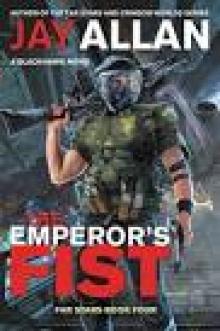 The Emperor's Fist
The Emperor's Fist Blood on the Stars Collection 1
Blood on the Stars Collection 1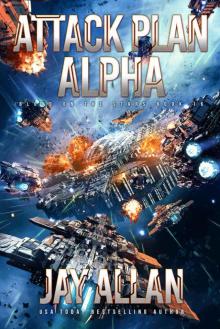 Attack Plan Alpha (Blood on the Stars Book 16)
Attack Plan Alpha (Blood on the Stars Book 16)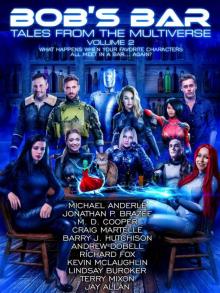 BOB's Bar (Tales From The Multiverse Book 2)
BOB's Bar (Tales From The Multiverse Book 2) The Others
The Others Nightfall
Nightfall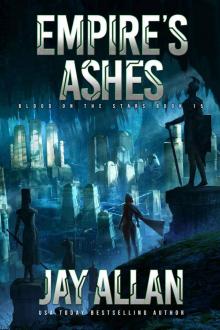 Empire's Ashes (Blood on the Stars Book 15)
Empire's Ashes (Blood on the Stars Book 15) Wings of Pegasus
Wings of Pegasus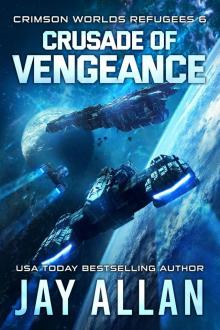 Crusade of Vengeance
Crusade of Vengeance The Last Stand
The Last Stand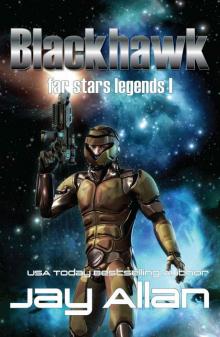 Blackhawk: Far Stars Legends I
Blackhawk: Far Stars Legends I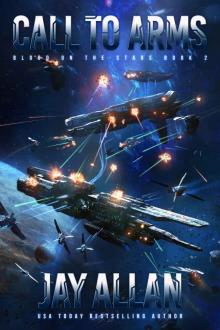 Call to Arms: Blood on the Stars II
Call to Arms: Blood on the Stars II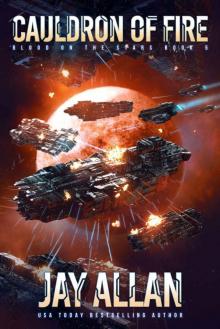 Cauldron of Fire (Blood on the Stars Book 5)
Cauldron of Fire (Blood on the Stars Book 5) Revenge of the Ancients: Crimson Worlds Refugees III
Revenge of the Ancients: Crimson Worlds Refugees III Crimson Worlds Successors: The Complete Trilogy
Crimson Worlds Successors: The Complete Trilogy The Grand Alliance
The Grand Alliance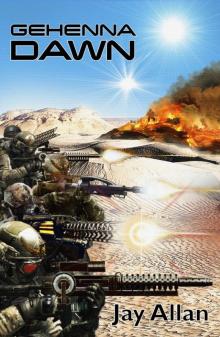 Portal Wars 1: Gehenna Dawn
Portal Wars 1: Gehenna Dawn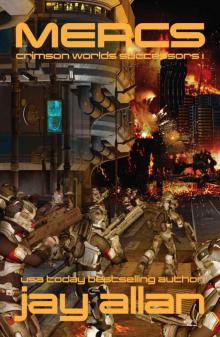 MERCS: Crimson Worlds Successors
MERCS: Crimson Worlds Successors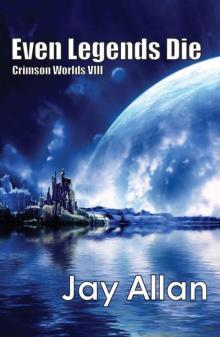 Crimson Worlds: 08 - Even Legends Die
Crimson Worlds: 08 - Even Legends Die Winds of Vengeance
Winds of Vengeance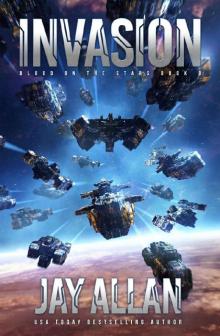 Invasion (Blood on the Stars Book 9)
Invasion (Blood on the Stars Book 9) A Little Rebellion (Crimson Worlds III)
A Little Rebellion (Crimson Worlds III)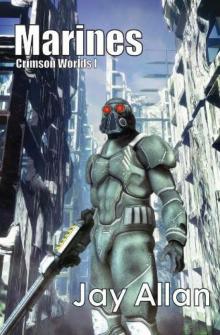 Marines
Marines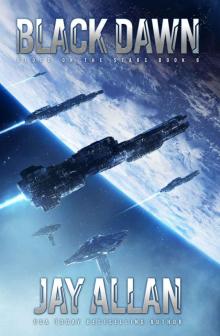 Black Dawn (Blood on the Stars Book 8)
Black Dawn (Blood on the Stars Book 8)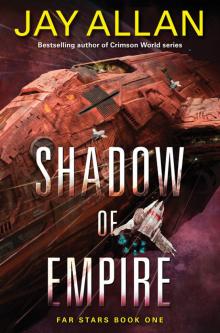 Shadow of Empire
Shadow of Empire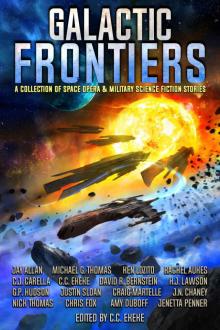 Galactic Frontiers: A Collection of Space Opera and Military Science Fiction Stories
Galactic Frontiers: A Collection of Space Opera and Military Science Fiction Stories Winds of Vengeance (Crimson Worlds Refugees Book 4)
Winds of Vengeance (Crimson Worlds Refugees Book 4)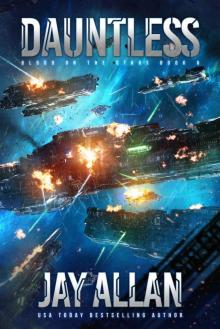 Dauntless (Blood on the Stars Book 6)
Dauntless (Blood on the Stars Book 6) Portal Wars: The Trilogy
Portal Wars: The Trilogy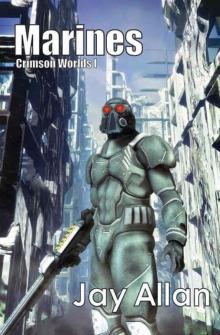 Marines cw-1
Marines cw-1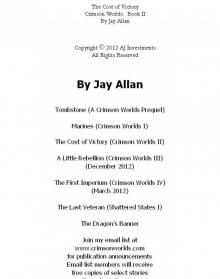 The Cost of Victory
The Cost of Victory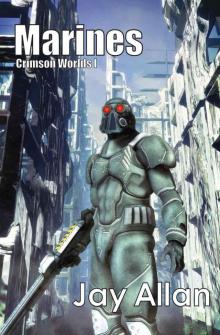 Marines (Crimson Worlds)
Marines (Crimson Worlds)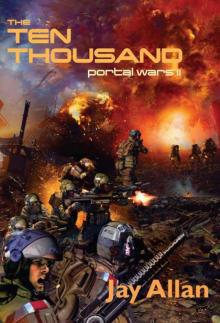 The Ten Thousand: Portal Wars II
The Ten Thousand: Portal Wars II The White Fleet (Blood on the Stars Book 7)
The White Fleet (Blood on the Stars Book 7)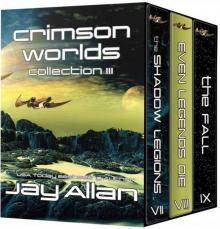 Crimson Worlds Collection III
Crimson Worlds Collection III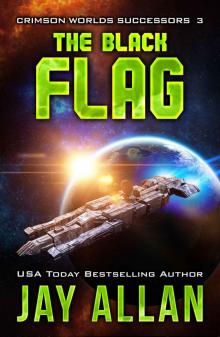 The Black Flag (Crimson Worlds Successors Book 3)
The Black Flag (Crimson Worlds Successors Book 3)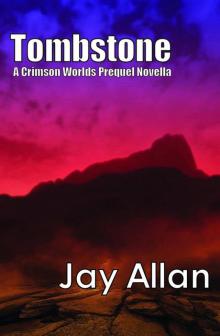 Tombstone
Tombstone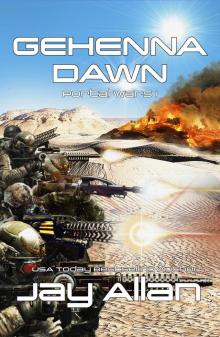 Gehenna Dawn
Gehenna Dawn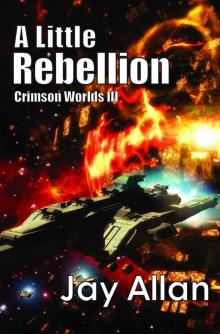 A Little Rebellion (Crimson Worlds)
A Little Rebellion (Crimson Worlds)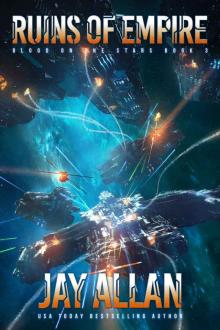 Ruins of Empire: Blood on the Stars III
Ruins of Empire: Blood on the Stars III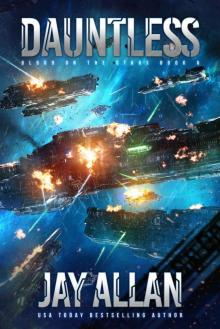 Dauntless
Dauntless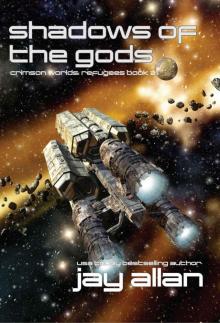 Shadows of the Gods: Crimson Worlds Refugees II
Shadows of the Gods: Crimson Worlds Refugees II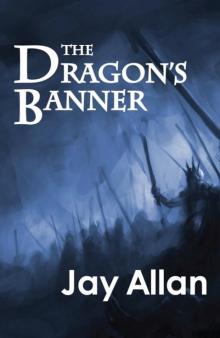 The Dragon's Banner
The Dragon's Banner Echoes of Glory (Blood on the Stars Book 4)
Echoes of Glory (Blood on the Stars Book 4)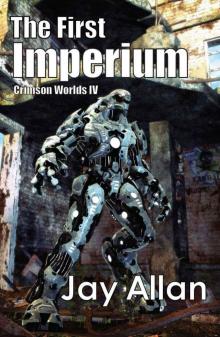 Crimson Worlds: 04 - The First Imperium
Crimson Worlds: 04 - The First Imperium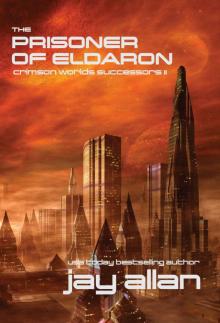 The Prisoner of Eldaron: Crimson Worlds Successors II
The Prisoner of Eldaron: Crimson Worlds Successors II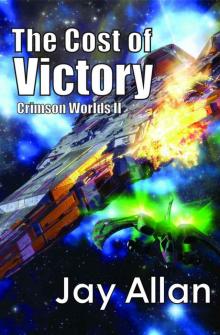 The Cost of Victory (Crimson Worlds)
The Cost of Victory (Crimson Worlds)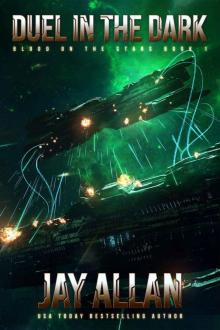 Duel in the Dark: Blood on the Stars I
Duel in the Dark: Blood on the Stars I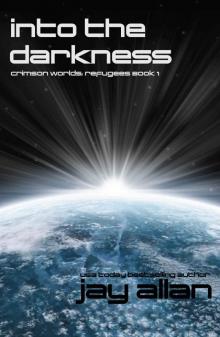 Into the Darkness: Crimson Worlds Refugees I
Into the Darkness: Crimson Worlds Refugees I Crimson Worlds Refugees: The First Trilogy
Crimson Worlds Refugees: The First Trilogy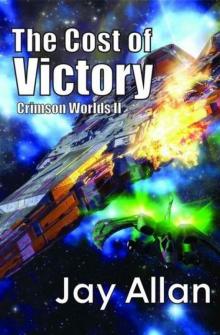 The Cost of Victory cw-2
The Cost of Victory cw-2 Stars & Empire 2: 10 More Galactic Tales (Stars & Empire Box Set Collection)
Stars & Empire 2: 10 More Galactic Tales (Stars & Empire Box Set Collection)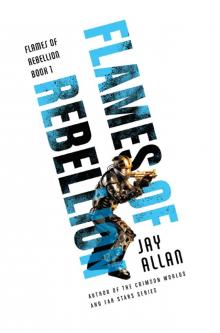 Flames of Rebellion
Flames of Rebellion Stars & Empire: 10 Galactic Tales
Stars & Empire: 10 Galactic Tales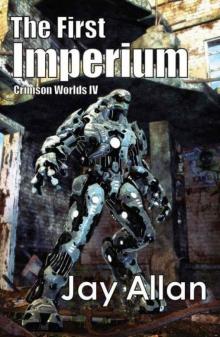 The First Imperium cw-4
The First Imperium cw-4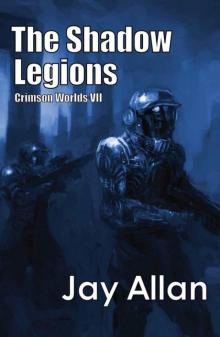 Crimson Worlds: 07 - The Shadow Legions
Crimson Worlds: 07 - The Shadow Legions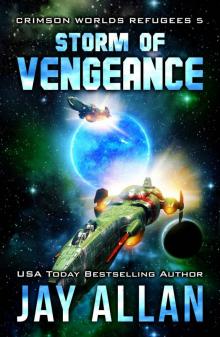 Storm of Vengeance
Storm of Vengeance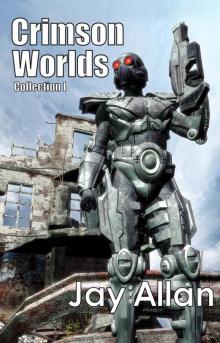 Crimson Worlds Collection I
Crimson Worlds Collection I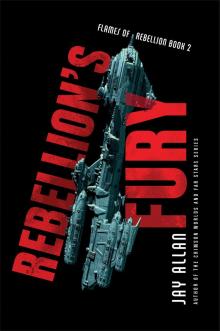 Rebellion's Fury
Rebellion's Fury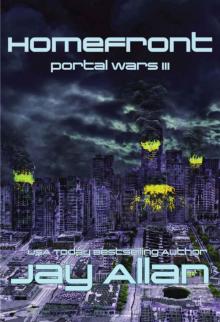 Homefront: Portal Wars III
Homefront: Portal Wars III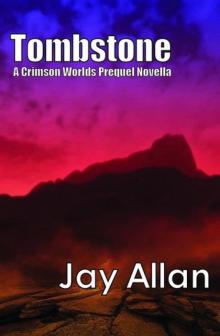 Tombstone (crimson worlds)
Tombstone (crimson worlds) Crimson Worlds: Prequel - Bitter Glory
Crimson Worlds: Prequel - Bitter Glory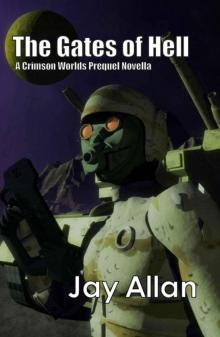 Crimson Worlds: Prequel - The Gates of Hell
Crimson Worlds: Prequel - The Gates of Hell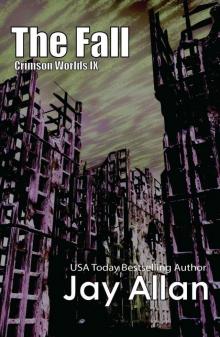 The Fall: Crimson Worlds IX
The Fall: Crimson Worlds IX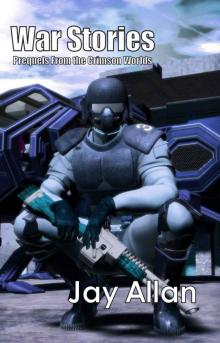 Crimson Worlds: War Stories: 3 Crimson Worlds Prequel Novellas
Crimson Worlds: War Stories: 3 Crimson Worlds Prequel Novellas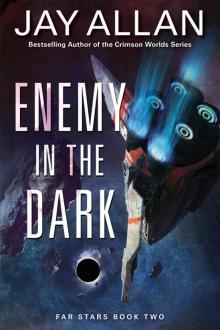 Enemy in the Dark
Enemy in the Dark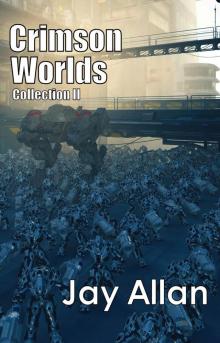 Crimson Worlds Collection II
Crimson Worlds Collection II